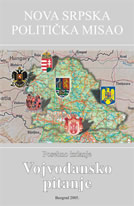| NSPM in English | |||
Our Tin-Pot Autocrat |
 |
 |
 |
| понедељак, 17. август 2009. | |
|
(The National Interest, 10.08. 2009)
In a recent opinion article in the Washington Post, Georgian President Mikheil Saakashvili repeated his frequent claim that the Russian military operation “was a long-planned invasion aimed at toppling my government and increasing Moscow’s control over our region.” During his July trip to Tbilisi, Vice President Joseph Biden seemed to support Saakashvili’s position by stating that Russia “used a pretext to invade your country.” This is nonsense. Reports from the Organization for Cooperation and Security in Europe’s (OSCE) observers on the ground, independent journalists and, most importantly, a number of senior Georgian officials who later broke with the Saakashvili regime, all confirm that it was the Georgian president who personally ordered a tank assault on the South Ossetian capital of Tskhinvali and, specifically, on the Russian peacekeeping unit located there. This conclusion is widely shared by CIA and Pentagon intelligence analysts. It is difficult to explain why Mr. Biden sounded unaware of this while accompanied to Georgia by officials from the National Security Council, the State Department, and the Pentagon. Nor was Saakashvili caught in some kind of a trap. On the contrary, for many months the Russian government warned that independence for Kosovo—changing the borders of Serbia, a sovereign democratic state, against its will—would be a precedent for Abkhazia and South Ossetia. Senior Russian officials stated both publicly and privately, in discussions with their U.S. counterparts, that Moscow would not immediately recognize Abkhazia and South Ossetia as independent states in response to Kosovo’s independence, but that it would be receptive to “requests” from both enclaves for greater integration with Russia. A larger Russian economic and military presence quickly followed. Saakashvili responded to this with high-profile and high-risk harassment of Russian peacekeepers, arresting them, seizing their equipment, and humiliating them in public. Both Georgian- and Russian-controlled South Ossetian forces stepped up artillery attacks. Prime Minister Vladimir Putin, and later President Dmitry Medvedev, sent a clear message that Tbilisi would not be allowed to re-establish control of Abkhazia and South Ossetia by force. Russia ceased compliance with the Conventional Forces in Europe treaty, enabling it to move more armored units into southern Russia and conducted major military maneuvers not far from the border. During one incident between Georgian and South Ossetian forces, two Russian combat aircraft flew over a Georgian position to demonstrate to Tbilisi that Moscow was not a paper tiger. Despite this, Saakashvili was apparently convinced that he could press Moscow harder and harder with impunity. As both Georgian and Russian officials later told me, Saakashvili was not only openly dismissive in his conversations with Vladimir Putin, but went so far as to tell a senior Russian official visiting Tbilisi that he should convey to Russia’s president that if Moscow stood in the way of Saakashvili’s plans in Abkhazia and South Ossetia, the Georgian army would teach Russia a lesson, driving Russian troops to back to Rostov, hundreds of miles from South Ossetia. The Georgian president demonstrated his contempt for Russian power and resolve in the strategy that he chose in trying to occupy South Ossetia. Rather than sending tank columns around Russian forces in Tskhinvali to block the Roki Tunnel, the only highway between Russia and the enclave, and to present Moscow with a fait accompli, Saakashvili overrode this recommendation of some of his advisors and recklessly ordered a frontal assault on the Russian peacekeeping detachment. At that point, Moscow had a choice between accepting humiliation and responding with force. How could Saakashvili have been surprised at Moscow’s decision to fight—and fight hard? Contrary to some allegations in the West and particularly the United States, the Russian military operation was measured and, with some exceptions, proportionate. Russian aircraft attacked Georgian military targets. To the extent there was collateral damage, it appeared limited, unintentional, and usually close to Georgian military targets. Despite the virtual collapse of Georgian forces, Russian troops did not attempt to occupy Tbilisi or remove the Georgian president from power by force. Not so long ago, the United States invaded Panama and removed President Manuel Noriega from office with a case against him no stronger than Russia’s grievances vis-à-vis Saakashvili. In some cases, Russian troops clearly moved too far out of South Ossetia and into Georgia proper, remaining for a couple of weeks longer than militarily necessary. However, the movement of Russian forces was not unrelated to Saakashvili’s orders to the Georgian military cease its resistance and run away from Russian forces. The Georgian president told his associates in Tbilisi that he wanted to preserve Georgia’s remaining military capability and to entice the Russian military further into Georgia so that the United States and the West in general would feel obliged to help him. More generally, few nations in the post-Soviet space viewed the Russian invasion of Georgia as a precedent for what Moscow might be prepared to do to them. None of Russia’s neighbors recognized the independence of Abkhazia and South Ossetia and there is little evidence that any of them were intimidated or became more accommodating toward Moscow as a result of the war. Nor have any of Russia’s neighbors significantly increased their military budgets due to new fear. This lack of alarm is a function of the limited nature of the Russian military operation in Georgia, of Abkhazia’s and South Ossetia’s de facto independence for most of the last fifteen years, and, of course, of the fact that Georgian troops attacked the Russians first—an example few others apparently intend to follow. Most in Russia’s neighborhood were clearly apprehensive about Moscow’s display of force, but few to none have come to the conclusion that they should declare fealty to a new Russian Empire. Nor is there real danger of another Russian invasion of Georgia, unless Saakashvili again attacks first or engages in massive military provocations. This seems unlikely because the Obama administration has been much clearer than the Bush administration in stating that it would not support a military adventure against Russia. European Union observers on the Georgian side of the border with Abkhazia and South Ossetia also contribute to stability. That Russia has a reasonable case for its response to Saakashvili’s attack does not excuse Moscow for its other odious international conduct, whether in pressuring foreign investors, denying responsibility for providing natural gas to its customers, or elsewhere. But hopefully it will prompt at least some reflection as the United States and Europe consider how to deal with Moscow. The United States is right not to recognize Abkhazian and South Ossetian independence if for no other reason than the fact that they are not truly independent. And it would be more than a little strange for America to recognize the two territories before close Russian allies like Belarus, Armenia, and Kazakhstan. On the other hand, there is nothing the United States and NATO can do to change the situation on the ground, and there is no rationale for making the status of Abkhazia and South Ossetia into a major stumbling block in relations with Russia. After all, the Russians do not recognize the independence of Kosovo but hardly attempt to make it a defining issue in relations with the United States. If the United States wants to improve the odds that South Ossetia and more likely Abkhazia will ever be affiliated with Georgia again, ignoring them, and ensuring their total dependence on Russia, is the path least likely to succeed. The humanitarian assistance so generously provided to Georgia should be shared with the residents of Abkhazia and South Ossetia. And in the case of Abkhazia, which unlike South Ossetia really wants to be independent from Russia, it might make sense to allow unofficial exchanges and low-level economic cooperation. Georgia itself also needs and deserves U.S. support. But supporting Georgia’s tin-pot autocrat, Mikheil Saakashvili, is contrary to American interests and American values, notwithstanding his apparent shotgun conversion to dialogue and compromise with his domestic opposition. Fortunately, that opposition is overwhelmingly democratic, pro-Western, and eager for American understanding and sympathy. To that much, it is fully entitled. (Dimitri K. Simes is the publisher of The National Interest) |
Остали чланци у рубрици
- Playing With Fire in Ukraine
- Kosovo as a res extra commercium and the alchemy of colonization
- The Balkans XX years after NATO aggression: the case of the Republic of Srpska – past, present and future
- Из архиве - Remarks Before the Foreign Affairs Committee of the European Parliament
- Dysfunction in the Balkans - Can the Post-Yugoslav Settlement Survive?
- Serbia’s latest would-be savior is a modernizer, a strongman - or both
- Why the Ukraine Crisis Is the West’s Fault
- The Ghosts of World War I Circle over Ukraine
- Nato's action plan in Ukraine is right out of Dr Strangelove
- Why Yanukovych Said No to Europe

.jpg)








 In the year since the Georgian attack on South Ossetia and the Russian peacekeeping battalion stationed there, the facts of what transpired have been largely established beyond a reasonable doubt. Yet the myths of the conflict persist in the media and, more dangerously, among American policy makers.
In the year since the Georgian attack on South Ossetia and the Russian peacekeeping battalion stationed there, the facts of what transpired have been largely established beyond a reasonable doubt. Yet the myths of the conflict persist in the media and, more dangerously, among American policy makers.












